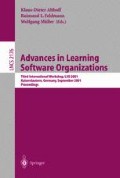Abstract
Measurement is needed for project control, quality assurance, and process improvement activities in software development. Measurement planning is a difficult and time-consuming activity. Therefore, a great interest exists in reusing measurement plans. However, most measurement plans are structured intuitively and are written informally. Therefore, they are difficult to understand and to reuse. The contents of measurement plans strongly depend on the object being measured and the quality focus of measurement. Process models (describing the object) and quality models (describing the quality focus) change from project to project and over time. Therefore, in order to reuse measurement plans from one project to the next, relationships between measurement plans and process and quality models are needed. These relationships can be used to identify and adapt existing measurement plans to varying process and quality models. This paper presents a formal conceptual model of measurement plans including relationships to process and quality models and a development process for such measurement plans. This model and process build a sound basis for reuse of measurement plans. To further support reuse, a conceptual model for components of measurement plan elements is sketched. Components can be reused to build new measurement plans. A rudimentary reuse process is proposed that starts from a similarity analysis of the (reused and new) underlying process model and quality models.
Access this chapter
Tax calculation will be finalised at checkout
Purchases are for personal use only
Preview
Unable to display preview. Download preview PDF.
References]
James W. Armitage and Marc I. Kellner. A conceptual schema for process definitions and models. In Dewayne E. Perry, editor, Proceedings of the Third International Conference on the Software Process, pages 153–165. IEEE Computer Society Press, October 1994.
Victor R. Basili. Applying the Goal/Question/Metric paradigm in the experience factory. In Norman Fenton, Robin Whitty, and Yoshinori Iizuka, editors, Software Quality Assurance and Measurement: A Worldwide Perspective, pages 21–44. International Thompson Computer Press, 1995
Victor R. Basili and David M. Weiss. A methodology for collecting valid software engineering data. IEEE Transactions on Software Engineering, SE-10(6):728–738, November 1984
Lionel C. Briand, Christiane M. Differding, and H. Dieter Rombach. Practical guidelines for measurement-based process improvement. Software Process, 2(4):253–280, December 1996.
Alfred Bröckers, Christiane Differding, Barbara Hoisl, Frank Kollnischko, Christopher M. Lott, Jürgen Münch, Martin Verlage, and Stefan Vorwieger. A graphical representation schema for the software process modeling language MVP-L. Technischer Bericht 270/95, Fachbereich Informatik, Universität Kaiserslautern, 67653 Kaiserslautern, June 1995.
Christiane Differding. Adaptive Measurement Plans for Software development. Dissertation. Department of Computer Science, University of Kaiserslautern, Germany, November 2000.
Christiane Gresse von Wangenheim. Remex-a case-based approach for reusing software measurement experience. In Case-Besed Reasoning Research and Development. Third International Conference on Case-based reasoning ICCBR’99. Proceedings, pages 173–187, 1999.
Christiane Gresse and Lionel Briand. Requirements for the Knowledge-Based Support of Software Engineering Measurement Plans. In Proceedings of the Ninth International Software Engineering and Knowledge Engineering Conference (SEKE’97), pages 559–568, Madrid, Spain, June 1997.
Christiane Gresse, Barbara Hoisl, and Jürgen Wüst. A process model for GQM-based measurement. Technical Report STTI-95-04-E, Software Technologie Transfer Initiative Kaiserslautern, Fachbereich Informatik, Universität Kaiserslautern, D-67653 Kaiserslautern, 1995.
Christiane Gresse von Wangenheim, Alexandre Moraes Ramos, Klaus-Dieter Althoff, Ricardo M. Barcia, Rosina Weber, and Alejandro Martins. Case-based reasoning approach to reuse of experiential knowledge in software measurement programs. In Lothar Gierl, editor, Proceedings of the Sixth German Workshop on Case-Based Reasoning, Berlin, Germany, 1998.
Christiane Gresse von Wangenheim, Klaus-Dieter Althoff, and Ricardo M. Barcia. Intelligent retrieval of software engineering experienceware. In Proceedings of the Eleventh Conference on Software Engineering and Knowledge Engineering, pages 128–135, Kaiserslautern, Germany, June 1999. Knowledge Systems Institute, Skokie, IL, USA.
Christiane Gresse von Wangenheim, Klaus-Dieter Althoff, and Ricardo M. Barcia. Goaloriented and similarity-based retrieval of software engineering experienceware. In Guenther Ruhe and Frank Bomarius, editors, Learning Software Organizations-Methodology and Applications. Springer-Verlag, 2000.
Matthias Jarke, Manfred Jeusfeld, and Christoph Quix. Conceptbase 5.0 user manual. http:// www-i5.informatik.rwth-aachen.de/CBdoc/userManual, March 1998. viewed in 1998.
Hector Munoz-Avila, David W. Aha, Leonard A. Breslow, Dana S. Nau and Rosina Weber. Integrating Conversational Case retrieval with generative planning. To appear in Proceedings of the Fourth European Workshop on Case-Based Reasoning (EWCBR-2000). Trento, Italy, Springer-Verlag.
John Mylopoulos, Alex Borgida, Matthias Jerke, and Manolis Koubrakis. Telos: Representing knowledge about information systems. ACM Transactions on information systems, 8(4):325–362, oct 1990.
John Roche and Mike Jackson. Software measurement methods: recipes for success? Information and Software Technology, 36(3):173–189, 1994
H. Dieter Rombach. Practical benefits of goal-oriented measurement. In N. Fenton and B. Littlewood, editors, Software Reliability and Metrics, pages 217–235. Elsevier Applied Science, London, 1991.
Martin Verlage. Ein Ansatz zur Modellierung großer Softwareentwicklungsprozesse durch Integration unabhängig erfaßter rollenspezifischer Sichten. PhD thesis, Universität Kaiserslautern, 1997
Author information
Authors and Affiliations
Editor information
Editors and Affiliations
Rights and permissions
Copyright information
© 2001 Springer-Verlag Berlin Heidelberg
About this paper
Cite this paper
Differding, C.M. (2001). Reuse of Measurement Plans Based on Process and Quality Models. In: Althoff, KD., Feldmann, R.L., Müller, W. (eds) Advances in Learning Software Organizations. LSO 2001. Lecture Notes in Computer Science, vol 2176. Springer, Berlin, Heidelberg. https://doi.org/10.1007/3-540-44814-4_18
Download citation
DOI: https://doi.org/10.1007/3-540-44814-4_18
Published:
Publisher Name: Springer, Berlin, Heidelberg
Print ISBN: 978-3-540-42574-8
Online ISBN: 978-3-540-44814-3
eBook Packages: Springer Book Archive

